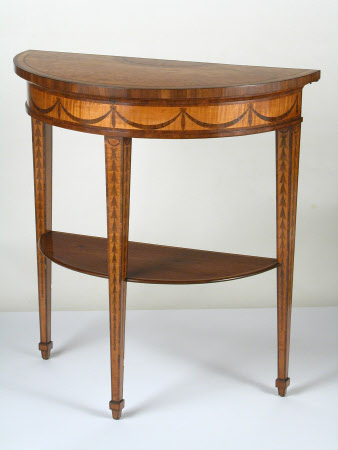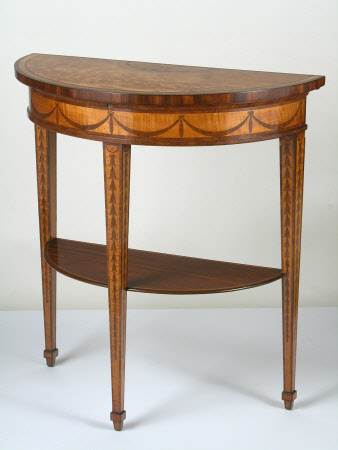Side table
possibly Haig & Chippendale (fl. 1779 - 1796)
Category
Furniture
Date
circa 1780 (and later)
Materials
Satinwood, tulipwood, holly, ash, oak construction, brass
Place of origin
London
Order this imageCollection
Stourhead, Wiltshire
NT 731572
Summary
A pair of satinwood, tulipwood and ash cross banded and holly inlaid demi circular side tables, possibly by Haig and Chippendale (fl.1779-1796) London circa 1780. The demi circular hinged top inlaid with a fan within a guilloche cross banded border. The whole of the top cross banded with ash and tulipwood and opening to reveal a recess with a frieze inlaid with swags and raised on square section tapered legs inlaid with bell flowers and headed by paterae, spade feet. The legs are joined by a later shelf stretcher.The tables have brass clips to the back underside to join them together to create a centre table.
Full description
This pair of tables are associated with a group of furniture at Stourhead with similar design features and which are in the style of work produced by the Chippendale workshops, but not securely documented at Stourhead. The Hoare family’s patronage of the Chippendale cabinet making practice can be traced back to the 1760s with the earliest connection being through Richard Hoare of Boreham (1739-1778). Dudley Dodd and Lucy Wood write extensively on the subject in their article ‘The ‘Weeping Women’ Commode and other orphaned furniture at Stourhead by the Chippendales, Senior and Junior’ Furniture History, Vol. 47 (2011) pp.47-124.
Provenance
Stourhead; given to the National Trust along with the house, its grounds, and the rest of the contents by Sir Henry Hugh Arthur Hoare, 6th Bt. (1865 – 1947) in 1946
Makers and roles
possibly Haig & Chippendale (fl. 1779 - 1796), cabinetmaker possibly Haig & Chippendale (fl. 1779 - 1796), designer
References
Dodd & Wood 2011, Dudley Dodd & Lucy Wood, 'The Weeping Women commode and other Orphaned Furniture by the Chippendales at Stourhead', in Furniture History XLVII (2011) Gilbert, 1978: Christopher Gilbert. The life and work of Thomas Chippendale. London: Studio Vista: Christie’s, 1978., pp. 235, 267 Beard and Gilbert, 1986: Geoffrey Beard and Christopher Gilbert (ed), Dictionary of English Furniture Makers 1660-1840, 1986, pg.169

